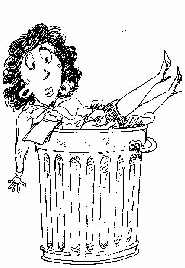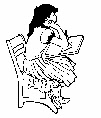

Make a point of visiting us weekly! Tell a friend about us.

Return to Becoming a Learner CONTENTS PAGE
Page 3: Looking at who you are
OK, we’ve observed that many of us think we lack anything worthwhile and we’re really only fit for being thrown out in the rubbish. But is that so? On this and the next page we’re going to suggest that this is far from the truth. But we need to do a recap before we move on.
OK, we did hint we’d ask you about page two so here goes:
1. What was the first thing we did on that page?
2. What were the five things we considered, examples of?
3. How did the Law tutor put the minds of the new students as rest?
4. How did he help them with revision at the end of the year?
2. What were the five things we considered, examples of?
3. How did the Law tutor put the minds of the new students as rest?
4. How did he help them with revision at the end of the year?
I’m not going to repeat the answers here but just suggest if you can’t remember them, you just go back a page and check them out again.
Part 1: The Right Frame of Mind

- Then there’s Eden. Don’t talk to Eden about school or you’ll hear some bad words! Eden is dyslexic and sees that as very limiting. Learning at school was tough stuff and learning today is best given a miss. Eden has a collection of indoor plants that seem to grow in numbers as the years pass and Eden enjoys pottering in the small back garden. Eden’s also got some nice paintings she’s done in the past, but they are tucked away now, behind the dresser, and she rarely thinks of the days when she painted.
Talents or abilities?
So what are you good at? Nothing? Probably not true! So what do you like doing? Not sure? Well what have you enjoyed doing in the past? Now I’ve gone as vague as that because some people just don’t know themselves. Consider the following imaginary people:
So what are you good at? Nothing? Probably not true! So what do you like doing? Not sure? Well what have you enjoyed doing in the past? Now I’ve gone as vague as that because some people just don’t know themselves. Consider the following imaginary people:
- Chris works in a large, well-know High Street store. Chris would say he hasn’t got any particular talents – he likes football but doesn’t play, he liked ice skating but has only done it once – but in the store he’s known for listening to customers and helping them decide just what it is they need. Back at home, tucked away in a drawer – and he wouldn’t tell his friends about it – he’s got a pretty spectacular stamp collection he got together years ago. He comes into work on the bus and buys a paper that’s got a particularly good fun and games page in it which he works on each morning on the way in. But Chris doesn’t think he’s clever or that he’s a learner because he only got a couple of GCSE’s.

- Right, here’s Cameron. Cameron is the classic, ‘I-can’t-do-it’ person. But Cameron’s got a Gran who she visits each week and while she’s there she helps Gran sort through her post – because Gran’s eyes are not so good as they were – and fills in forms for Gran and pays bills for her. Gran still manages to knit and has got Cameron to move on from just holding her arms out to hold the wool while Gran winds it into ball, to starting to do elementary stitches herself which she adds to each time she comes round. But Cameron say’s she’s not a learner. Cameron works part-time on a till at a local supermarket.

Under the Microscope
So OK, let’s put our people above, under a microscope, so to speak. They all have two things in common: first, they think they are rubbish when it comes to talking about gifts and abilities and, second, they each DO actually have a number of abilities. Before we go any further, why don’t you take a pen and paper, and scroll back up the page and see what things you can identify that each of these people is good at and what it says about them
So OK, let’s put our people above, under a microscope, so to speak. They all have two things in common: first, they think they are rubbish when it comes to talking about gifts and abilities and, second, they each DO actually have a number of abilities. Before we go any further, why don’t you take a pen and paper, and scroll back up the page and see what things you can identify that each of these people is good at and what it says about them

Learning Preferences
Before we go back and look at those three people again – you do it first! – let’s observe some more people and note what they are doing.
Before we go back and look at those three people again – you do it first! – let’s observe some more people and note what they are doing.
-
With a book in front of her, Ellis can see it as clear as a bell. Occasionally she turns to her computer and checks out stuff on Wikipeadia and, again, just reading it makes so much sense.

- Let me now introduce you to Fran. Fran is training to be a surveyor for a builder and goes into college once a week. Ask her how she’s getting on. “Yes, well, all right I suppose. I enjoy the stuff on site, setting out and all that but I’m not very keen on having to do college. Writing and me don’t go very well and I don’t like it when the tutors just give you learning packs to work through. Actually (and her face lights up) one of the best lessons was when the tutor was introducing us to surveying instruments and had set up half a dozen from very old to very new and simply said, ‘there they are. Find out how they work’. They were fun to play with!”

- Harley is a different person all together. Harley has decided to learn a language and has found a website that teaches German. Ask him how he’s getting on. “Oh, it’s great. I love listening to the words being spoken out and then having to repeat them. When I hear stuff I take it in straight away. I wish I could do that as well when they show you the words and you obviously have to learn them to be able to write them as well as speak them. That I don’t find as easy.”

Now did you spot the different ways the three people here were learning? Each one had a particular preference, a particular way they preferred to learn.
Ellis learned best by READING so for her, books and the Internet were far more preferable to listening to lectures and if you gave her something to do physically, she’d have been looking for excuses to miss the class.
Fran, the trainee surveyor, in stark contrast, is a HANDS-ON person and learns best by DOING. Reading or listening don’t do much for Fran.
Harley is a LISTENER. Words are the means of taking in for for him.
Now the truth is, of course, that we all use a variety of learning techniques so even if we are a ‘hands-on’ person, we will still take in some of what we hear or read; it’s just that we learn most by using our particular preference.
There is a lot of debate on the Internet about how much we take in through different methods, so all we will say is, watch how you respond to different approaches and note the one to which you respond best.
Unfortunately, using a webpage like this one, it is all visual which may limit its acceptance to you. However, if you have read this far, you don’t have much trouble with reading and if your preference is one of the other styles, it just means you’ll need to make a little more effort to cope with all these words – but we will try to make it interesting and easy to see.
Because we want to keep each of these pages relatively short, we’re going to leave our three untalented people until the next page – but hang on to your piece of paper and, if you haven’t done the exercise yet, please scroll back up to them and jot down the things you see they have learnt or the abilities you think they have. See you soon!
Ellis learned best by READING so for her, books and the Internet were far more preferable to listening to lectures and if you gave her something to do physically, she’d have been looking for excuses to miss the class.
Fran, the trainee surveyor, in stark contrast, is a HANDS-
Harley is a LISTENER. Words are the means of taking in for for him.
Now the truth is, of course, that we all use a variety of learning techniques so even if we are a ‘hands-
There is a lot of debate on the Internet about how much we take in through different methods, so all we will say is, watch how you respond to different approaches and note the one to which you respond best.
Unfortunately, using a webpage like this one, it is all visual which may limit its acceptance to you. However, if you have read this far, you don’t have much trouble with reading and if your preference is one of the other styles, it just means you’ll need to make a little more effort to cope with all these words – but we will try to make it interesting and easy to see.
Because we want to keep each of these pages relatively short, we’re going to leave our three untalented people until the next page – but hang on to your piece of paper and, if you haven’t done the exercise yet, please scroll back up to them and jot down the things you see they have learnt or the abilities you think they have. See you soon!
